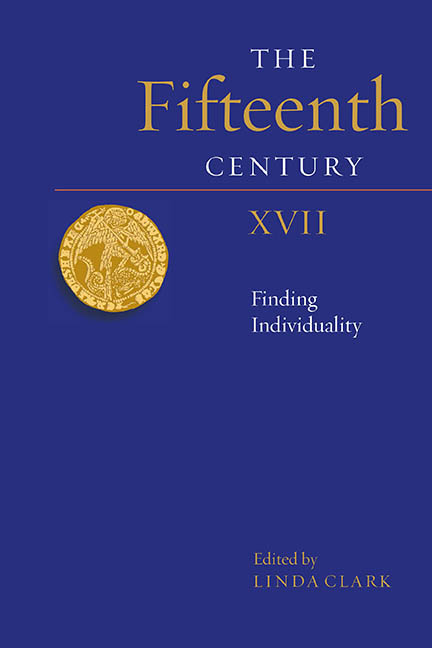Book contents
- Frontmatter
- Contents
- Contributors
- Preface
- Abbreviations
- Royal Wills, 1376–1475
- Propaganda, Piety and Politics in the Fifteenth Century: Henry V’s Vernacular War Letters to the City of London, 1417–21
- ‘To Be of Oon Demeanyng and Unite for the Wele of Your Self and of the Contre There’: Yorkist Plans for the Lordship of Ireland, the Last Phase
- A Mirror for a Princess: Antoine de la Sale and the Political Psyche of Margaret of Anjou
- Margaret of Anjou and the Language of Praise and Censure
- On ‘Peyne of their Lyfes … they Shuld no Verdit gif, but if they Wold Endite the Seid William Tresham of his Owen Deth’: the Murder of Lawyers in Fifteenth-Century England
- ‘Stond Horeson and Yelde thy Knyff’: Urban Politics, Language and Litigation in Late Medieval Canterbury
- ‘In to the Sterre Chambre’: Female Plaintiffs Before the King’s Council in the Reign of Henry VII
- Index
- Contents of Previous Volumes
‘Stond Horeson and Yelde thy Knyff’: Urban Politics, Language and Litigation in Late Medieval Canterbury
Published online by Cambridge University Press: 19 August 2020
- Frontmatter
- Contents
- Contributors
- Preface
- Abbreviations
- Royal Wills, 1376–1475
- Propaganda, Piety and Politics in the Fifteenth Century: Henry V’s Vernacular War Letters to the City of London, 1417–21
- ‘To Be of Oon Demeanyng and Unite for the Wele of Your Self and of the Contre There’: Yorkist Plans for the Lordship of Ireland, the Last Phase
- A Mirror for a Princess: Antoine de la Sale and the Political Psyche of Margaret of Anjou
- Margaret of Anjou and the Language of Praise and Censure
- On ‘Peyne of their Lyfes … they Shuld no Verdit gif, but if they Wold Endite the Seid William Tresham of his Owen Deth’: the Murder of Lawyers in Fifteenth-Century England
- ‘Stond Horeson and Yelde thy Knyff’: Urban Politics, Language and Litigation in Late Medieval Canterbury
- ‘In to the Sterre Chambre’: Female Plaintiffs Before the King’s Council in the Reign of Henry VII
- Index
- Contents of Previous Volumes
Summary
On the morning of 16 July 1500 William Atwode, a lawyer and one of the leading citizens of Canterbury, led some 200 of his friends and neighbours, ‘defencible arrayed in manner of warr’ and armed with ‘billes, swords, bokelers, bowes and arowes’ into the Rosier, an area consisting of five gardens and meadows belonging to the monks of Christ Church priory that lay in St. Dunstan's parish across the River Stour from the city's Westgate. There a group of the prior's servants was busy constructing a new watercourse. Once inside the Rosier, Atwode and his associates set about cutting down trees, destroying the new dyke and beating up the prior's servants. They then turned their attention to Thomas Ickham, a Christ Church monk, ‘sore syke and walking in the ffeldes for hys recreation’, rebuking him with ‘many fowle obprobrius words’ and putting him in jeopardy of his life. Their villainy did not stop there. They arrested the nine servants of the prior working in the Rosier, robbed them of their belongings and imprisoned them in the Westgate Tower, the city's gaol, for three days. Clearly on something of a roll, the gang then assaulted carters bringing hay to the priory, before rounding on one Thomas Iure, a priest, taking his sparrow-hawk and shutting him up in the Westgate too. Emboldened by his victory in the Rosier, Atwode made the prior's fish market his target for the next day's adventures. With the full knowledge of the mayor, John Plompton, he dismantled the market in its accustomed location in Burgate, forcing it to move to St. Margaret's Street in St. Andrew's parish within the city's jurisdiction. Clearly determined to hurt the monks where they would feel it most, Atwode commanded his followers to prevent fish reaching the priory, and a fish seller who attempted to bring halibut to the priory from Whitstable was assaulted at the city's gates. To consolidate the citizens’ victory, Atwode oversaw the construction of a new bridge over the Stour at Kingsmead, and diverted the river towards the king's mill there and away from the priory's own Barton mill.
- Type
- Chapter
- Information
- The Fifteenth Century XVIIFinding Individuality, pp. 115 - 128Publisher: Boydell & BrewerPrint publication year: 2020



